不能用于被动语态的整理总结word版本
英语不能用被动语态的情况

不能用被动语态的情况初中语法:1) 不及物动词或动词短语无被动语态:appear, die disappear, end (vi. 结束), fail, happen, last, lie, remain, sit, spread, stand break out, come true, fall asleep, keep silence, lose heart, take place.After the fire, very little remained of my house.比较:rise, fall, happen是不及物动词;raise, seat是及物动词。
(错) The price has been risen.(对) The price has risen.(错) The accident was happened last week.(对) The accident happened last week.(错) The price has raised.(对) The price has been raised.(错) Please seat.(对) Please be seated.要想正确地使用被动语态,就须注意哪些动词是及物的,哪些是不及物的。
特别是一词多义的动词往往有两种用法。
解决这一问题唯有在学习过程中多留意积累。
2) 不能用于被动语态的及物动词或动词短语:fit, have, hold, marry, own, wish, cost, notice, watch agree with, arrive at / in, shake hands with, succeed in, suffer from, happen to, take part in, walk into, belong to This key just fits the lock.Your story agrees with what had already been heard.3) 系动词无被动语态:appear, be become, fall, feel, get, grow, keep, look, remain, seem, smell, sound, stay, taste, turnIt sounds good.4) 带同源宾语的及物动词,反身代词,相互代词,不能用于被动语态:die, death, dream, live, lifeShe dreamed a bad dream last night.5) 当宾语是不定式时,很少用于被动语态。
英语:不能变被动结构的归纳.doc
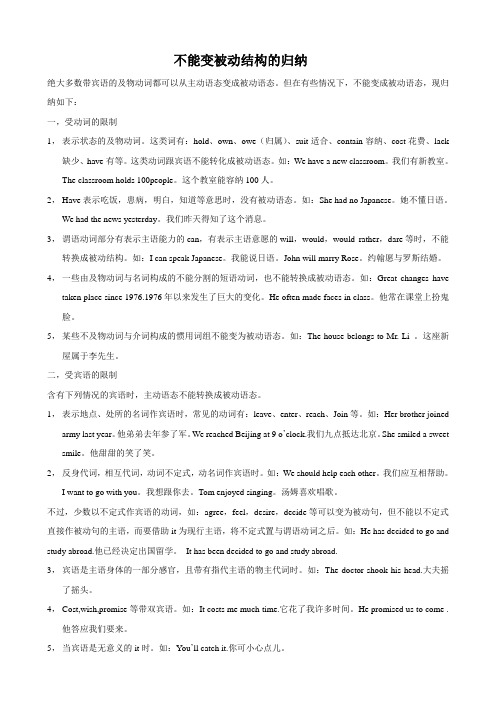
不能变被动结构的归纳绝大多数带宾语的及物动词都可以从主动语态变成被动语态。
但在有些情况下,不能变成被动语态,现归纳如下:一,受动词的限制1,表示状态的及物动词。
这类词有:hold、own、owe(归属)、suit适合、contain容纳、cost花费、lack 缺少、have有等。
这类动词跟宾语不能转化成被动语态。
如:We have a new classroom。
我们有新教室。
The classroom holds 100people。
这个教室能容纳100人。
2,Have表示吃饭,患病,明白,知道等意思时,没有被动语态。
如:She had no Japanese。
她不懂日语。
We had the news yesterday。
我们昨天得知了这个消息。
3,谓语动词部分有表示主语能力的can,有表示主语意愿的will,would,would rather,dare等时,不能转换成被动结构。
如:I can speak Japanese。
我能说日语。
John will marry Rose。
约翰愿与罗斯结婚。
4,一些由及物动词与名词构成的不能分割的短语动词,也不能转换成被动语态。
如:Great changes have taken place since 1976.1976年以来发生了巨大的变化。
He often made faces in class。
他常在课堂上扮鬼脸。
5,某些不及物动词与介词构成的惯用词组不能变为被动语态。
如:The house belongs to Mr. Li 。
这座新屋属于李先生。
二,受宾语的限制含有下列情况的宾语时,主动语态不能转换成被动语态。
1,表示地点、处所的名词作宾语时,常见的动词有:leave、enter、reach、Join等。
如:Her brother joined army last year。
他弟弟去年参了军。
We reached Beijing at 9 o’clock.我们九点抵达北京。
不能用于被动语态的几种情况总结

不能用于被动语态的几种情况总结Document number:PBGCG-0857-BTDO-0089-PTT1998不能用于被动语态的几种情况总结四川省阆中中学校任金石1、there be 结构及所有的不及物动词或动词短语充当谓语时,无被动语态。
:There are twelve moths in a year,Many of his songs have remained popular as ever,他的许多歌曲和以往一样仍然很流行。
Winning the medal is like a dream come true.获得奖牌好比梦想成真。
注:常见的不及物动词或动词短语有:appear, die, happen, lie(躺;位于), remain, occur, come true, break out, take place 等。
2、表示“状态”的谓语动词,如:last, hold, benefit, contain, equal, fit, join, mean, look like, consist of 等不能用被动语态。
:Each game lasts about an hour.每场比赛约一小时。
The committee consists of ten members.委员会由十人组成。
3、表示“归属”的动词,如have,own,belong to 等。
:We have three meals a day.我们一日吃三餐。
These islands belong to Spain.这些岛屿隶属西班牙。
4、表示“希望、意图”的动词,如wish,want,hope,like,love,hate等。
:But I hate autumn and winter。
但是我讨厌秋天和冬天。
5、宾语是反身代词或相互代词时谓语动词用主语语态,不能用被动语态。
:We should help each other.I found myself unable to speak.我发现自己说不出话了。
不能用于被动语态的动词

英语中不能用于被动语态的动词都有哪些?最佳答案你就记住一些动词应用中只能用主动表示被动。
1、Need, want, require, be worth后面接doing主动表被动。
The book is worth reading. 这本书值得一读。
The old building requires repairing. 这座古建筑需要修了。
Your hair wants/needs cutting (needs to be cut).你的头发该剪了。
2、不定式作定语,放在被修饰词后面,与前面被修饰的名词或代词有动宾关系,又在句子中与另一名词或代词有主谓关系,不定式要用主动表被动含义。
I have much work to do. 我有许多要做的事情。
(与work有动宾关系,与I有主谓关系)Tom is looking for a room to live in. Tom在找一间住的房间。
(与room有动宾关系,与Tom 有主谓关系)3、不定式修饰作表语和宾语补足语的形容词时,结构:主语+系动词+形容词+ 不定式;动词+宾语+形容词+不定式。
如果形容词是表示难易、利弊等含义,如:difficult, easy, comfortable, convenient(便利的,方便的), hard, cheap, expensive等,不定式用主动表被动。
The question is difficult to answer. 这个问题很难回答。
The work is easy to do. 这项工作很好做。
I found the car comfortable to ride in. 我觉得这种车很好坐。
4、在be to结构中的一些不定式:这种结构中的不定式通常应用主动表被动。
下列动词用不定式的主动形式表示被动意义:Who is to blame for starting the fire?这场火灾应由谁负责?You are to blame for the accident. 你应为这事受动责备。
2019-2020新课堂英语选修八北师大版讲义:Unit 22-5 Word版含答案
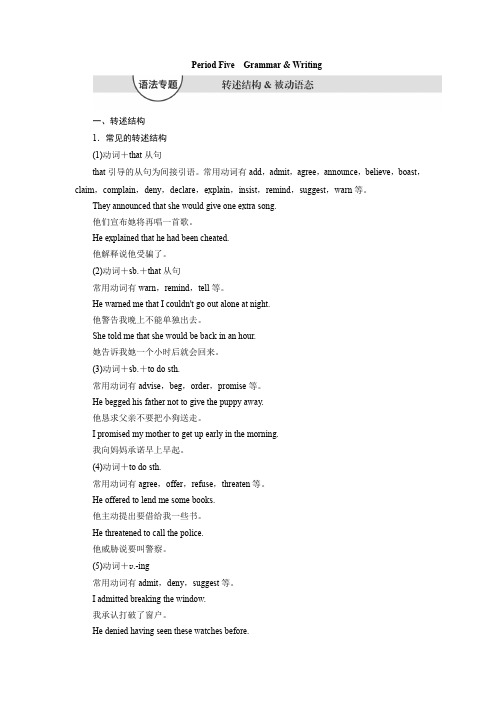
Period Five Grammar & Writing一、转述结构1.常见的转述结构(1)动词+that从句that引导的从句为间接引语。
常用动词有add,admit,agree,announce,believe,boast,claim,complain,deny,declare,explain,insist,remind,suggest,warn等。
They announced that she would give one extra song.他们宣布她将再唱一首歌。
He explained that he had been cheated.他解释说他受骗了。
(2)动词+sb.+that从句常用动词有warn,remind,tell等。
He warned me that I couldn't go out alone at night.他警告我晚上不能单独出去。
She told me that she would be back in an hour.她告诉我她一个小时后就会回来。
(3)动词+sb.+to do sth.常用动词有advise,beg,order,promise等。
He begged his father not to give the puppy away.他恳求父亲不要把小狗送走。
I promised my mother to get up early in the morning.我向妈妈承诺早上早起。
(4)动词+to do sth.常用动词有agree,offer,refuse,threaten等。
He offered to lend me some books.他主动提出要借给我一些书。
He threatened to call the police.他威胁说要叫警察。
(5)动词+v.-ing常用动词有admit,deny,suggest等。
I admitted breaking the window.我承认打破了窗户。
无被动语态情况
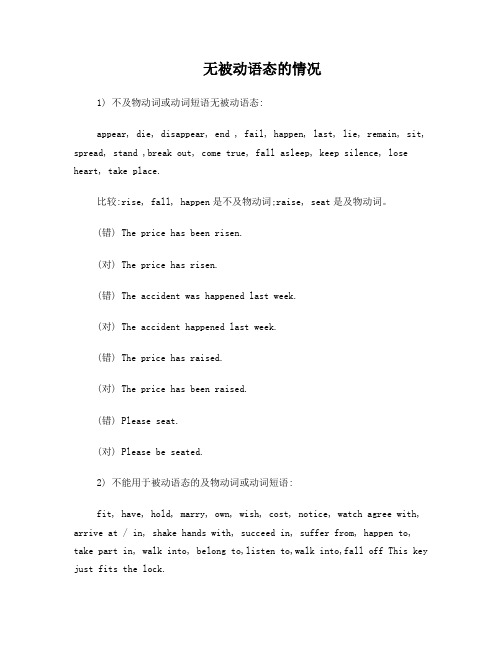
无被动语态的情况1) 不及物动词或动词短语无被动语态:appear, die, disappear, end , fail, happen, last, lie, remain, sit, spread, stand ,break out, come true, fall asleep, keep silence, lose heart, take place.比较:rise, fall, happen是不及物动词;raise, seat是及物动词。
(错) The price has been risen.(对) The price has risen.(错) The accident was happened last week.(对) The accident happened last week.(错) The price has raised.(对) The price has been raised.(错) Please seat.(对) Please be seated.2) 不能用于被动语态的及物动词或动词短语:fit, have, hold, marry, own, wish, cost, notice, watch agree with, arrive at / in, shake hands with, succeed in, suffer from, happen to, take part in, walk into, belong to,listen to,walk into,fall off This key just fits the lock.Your story agrees with what had already been heard.3) 系动词无被动语态:appear, be, become, fall, feel, get, grow, keep, look, remain, seem, smell, sound, stay, taste, turn It sounds good.4. 祈使句一般没有被动语态。
英语中不能用于被动语态的动词都有哪些

英语中不能用于被动语态的动词都有哪些?希望高手总结一下,最好每个带一个例句。
最佳答案你就记住一些动词应用中只能用主动表示被动。
1、Need, want, require(要求,需要), deserve(应得,值得), be worth值得),not bear(经不住) 后面接doing主动表被动。
The book is worth reading. 这本书值得一读。
The old building requires repairing. 这座古建筑需要修了。
These young seedlings will require/need looking after (=need to be looked after) carefully. 这些幼苗将需要小心的照管。
Your hair wants/needs cutting (needs to be cut). 你的头发该剪了。
2、不定式作定语,放在被修饰词后面,与前面被修饰的名词或代词有动宾关系,又在句子中与另一名词或代词有主谓关系,不定式要用主动表被动含义。
I have much work to do. 我有许多要做的事情。
(与work有动宾关系,与I有主谓关系)Tom is looking for a room to live in. Tom在找一间住的房间。
(与room有动宾关系,与Tom 有主谓关系)He has a family to support. 他要维持一个家庭。
(与family有动宾关系,与he有主谓关系)3、不定式修饰作表语和宾语补足语的形容词时,结构:主语+系动词+形容词+ 不定式;动词+宾语+形容词+不定式。
如果形容词是表示难易、利弊等含义,如difficult, easy, comfortable(舒适的), convenient(便利的,方便的), hard, cheap, expensive, 等,不定式用主动表被动。
完整word版,不用被动语态的N种情况
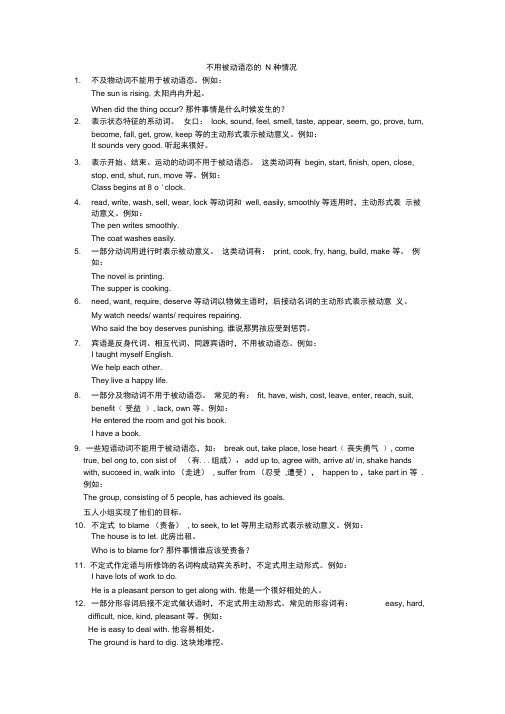
不用被动语态的N 种情况1. 不及物动词不能用于被动语态。
例如:The sun is rising. 太阳冉冉升起。
When did the thing occur? 那件事情是什么时候发生的?2. 表示状态特征的系动词。
女口:look, sound, feel, smell, taste, appear, seem, go, prove, turn,become, fall, get, grow, keep 等的主动形式表示被动意义。
例如:It sounds very good. 听起来很好。
3. 表示开始、结束、运动的动词不用于被动语态。
这类动词有begin, start, finish, open, close,stop, end, shut, run, move 等。
例如:Class begins at 8 o 'clock.4. read, write, wash, sell, wear, lock 等动词和well, easily, smoothly 等连用时,主动形式表示被动意义。
例如:The pen writes smoothly.The coat washes easily.5. 一部分动词用进行时表示被动意义。
这类动词有:print, cook, fry, hang, build, make 等。
例如:The novel is printing.The supper is cooking.6. need, want, require, deserve 等动词以物做主语时,后接动名词的主动形式表示被动意义。
My watch needs/ wants/ requires repairing.Who said the boy deserves punishing. 谁说那男孩应受到惩罚。
7. 宾语是反身代词、相互代词、同源宾语时,不用被动语态。
例如:I taught myself English.We help each other.They live a happy life.8. 一部分及物动词不用于被动语态。
英语中不能用于被动语态的动词都有哪些

1.need, want, require(央供,需要), deserve(应得,值得), be worth值得),not bear(经不住) +doing主动表主动. 之阳早格格创做Eg.The book is worth reading. 那本书籍值得一读.The old building requires repairing. 那座古兴办需要建了.These young seedlings will require/need looking after (=need to be looked after) carefully.那些幼苗将需要留神的照管.Your hair wants/needs cutting (needs to be cut).您的头收该剪了.2. 大概式做定语,搁正在被建饰词汇后里,与前里被建饰的名词汇或者代词汇有动宾闭系,又正在句子中与另一名词汇或者代词汇有主谓闭系,大概式要用主动表主动含意.I have much work to do. 尔有许多要搞的事务.(与work有动宾闭系,与I有主谓闭系)Tom is looking for a room to live in. Tom正在找一间住的房间.(与room有动宾闭系,与Tom 有主谓闭系)He has a family to support.他要保护一个家庭.(与family有动宾闭系,与he有主谓闭系)3. 大概式建饰做表语战宾语补脚语的形容词汇时,结构:主语+系动词汇+形容词汇+ 大概式;动词汇+宾语+形容词汇+大概式.如果形容词汇是表示易易、利弊等含意,如difficult, easy, comfortable(恬静的), convenient(便当的,便当的), hard, cheap, expensive, 等,大概式用主动表主动.The question is difficult to answer. 那个问题很易回问.The work is easy to do. 那项处事很好搞.I found the car comfortable to ride in. 尔感触那种车很好坐.That makes poetry difficult to write. 那便使得诗很易写. 4. 正在be to结构中的一些大概式:那种结构中的大概式常常应用主动表主动.下列动词汇用大概式的主动形式表示主动意思:Who is to blame for starting the fire?那场火灾应由谁控制?You are to blame for the accident. 您应为那事受动责备.The house is to let.此房出租.A lot remains to do.还剩下许多事务要搞.5. 系动词汇不主动形式,然而有些系动词汇常表示主动意思.罕睹的有taste(吃起去), sound (听起去), prove(道明是),feel(摸上去感触), look(瞅起去),smell(闻起去)等,比圆:Your reason sounds reasonable.您的缘由听起去很合理.Good medicine tastes bitter to the mouth.良药苦心.6. 一些与can''t或者won''t连用的动词汇.时常使用的有:lock(锁住), shut(闭上) , open(挨启), act(上演), write(写),cut(砍,切),wear(脱,戴)等,用做不迭物动词汇时,用主动表主动.比圆:The door won''t open.那门挨不启.It can''t move.它不克不迭动.7. 一些动词汇如sell(出卖) , wash(洗), clean(挨扫), burn(焚烧), cook(煮)等与副词汇如well(好), easily(简单天), perfectly(格中天)等连用,描会真物的个性,用主动表主动,结构是主语+动词汇+加副词汇.比圆:The book sells well.那种书籍很滞销.These clothes wash easily.那些衣服很易洗.The pen writes well. 那笔很好写.8. 主语much, a great deal, little, what等,其表语如是大概式,则用大概式的主动表主动.What is to do? 搞什么?Much is to do. 太多要搞的事.9. 正在“there be”句型中做主语的定语如果当前分词汇时,所用的当前分词汇要用主动表主动意思.There is nothing doing these days. 那些天出事搞.I see there’s a good idea planning. 尔知讲又正在挨好主意.英语战汉语一般,其动做皆有主动战主动之分,汉语中不是所有的动词汇皆可采与主动结构;共样讲理,英语中也有很多动词汇不克不迭用于主动结构,即主动语态.英语中,除不迭物动词汇---即后里不克不迭加宾语的动词汇不克不迭用于主动语态中,另有下列情况不克不迭使用主动语态的结构:一、表示固态、容纳、切合等的及物动词汇.比圆:She has a nice car.The woolen coat fits her well.二、宾语是动词汇大概式、动名词汇.比圆:They promised me to go with me.Mr.Smith wanted to have a try.I enjoy listening to pop music.三、宾语是反身代词汇.比圆:She hurt herself this morning.They warned themselves to be careful.四、宾语是人身上的一部分或者器官.比圆:He put his hand on his chest and began to cough.I could hardly believe my ears.五、宾语是相互代词汇.比圆:They help each other in study.We must learn from each other.六、表示天面、处所、机构、大众、构制的名词汇做宾语.比圆:She joined the Party last year.My dad reached Beijing this afternoon.七、宾语表示止为、办法,正在意思上相称于状语.比圆:She did her best.We shall make up our minds.八、宾语表示数量、沉量、少度、大小等,正在意思上相称于状语.比圆:They walked two miles.The film lasted one and a half hours.This desk weighs 10kilograms.九、系动词汇sound,look,become,appear等也不克不迭用于主动语态.比圆:Miss Li became a doctor ten years ago.This plan sounds a good one.十、一些词汇,如happen,take place,occur,last,belong to等等,正在汉语角度瞅去可用主动结构,然而英语只可用主动结构.比圆:Great changes have taken place in my hometown since 1949.This car belongs to my uncle.十一、及物动词汇及其宾语正在意思上形成不可分隔的牢固词汇组.比圆:I made faces to have the baby laugh.We should never lose heart.十二、一些宾语从句也不克不迭形成主动语态,可则意思便变了.比圆:I knew that I was wrong then.(尔认识到当时尔错了.)It was known that I was wrong then.=I was known to be wrong then.(人们知讲当时尔错了.)十三、当宾语是抽象名词汇时.比圆:We showed special interest in science.十四、当宾语为共源宾语时.比圆:We lived a hard life in the old days.总之,是可用主动语态,除了应相识英语的一些语准则则除中,还要充分思量汉语的道话习惯,掌握其一般顺序,共时注意一些特殊情况,可则便会出现"华夏式英语",也出法教到"天讲的英语".越过"动词汇挖空"那讲闭 2004/01/02 10:56 英语领导报动词汇挖空往往让共教们一筹莫展.别着慢,听万教授缓缓讲去.一、"动词汇挖空"题的命题个性何为"动词汇的切合形式"呢?便单个止为动词汇去道,它波及到动词汇的时态、主谓普遍(常常有什么样的主语形式并决断了什么样的谓语动词汇形式即动词汇的单复数形式与人称的变更)、非谓语动词汇(如doing或者to do形式)、时常使用句型战习惯表白(即英语中约定雅成的表白)等.它主要考查真量如下:1.动词汇的谓语形式:动词汇时态(如普遍当前时、当前举止时等,其中波及到本形动词汇、动词汇的人称及数的变更,特天是"三单形式"、动词汇的"be+V-ing"形式等.)2.动词汇的非谓语形式:大概式(如do/to do)、V-ing等.3.动词汇的其余类转移形式:动词汇→名词汇(如work→worker;build→build- ing)、动词汇→形容词汇(如worry→worried;break→broken)等.二、"动词汇挖空"题的解题秘诀"动词汇挖空"题的解题秘诀可归纳为:最先,决定动词汇的考查类型:谓语形式、非谓语形式仍旧动词汇的其余类转移形式;其次,依据所考查的类型,采用动词汇的切合形式;末尾,查看所挖写的动词汇时态结构、非谓语形式是可精确,以及与其余词汇类的转移形式的拼写是可有误,是可切合题意央供等.为便当影象,现将此解题秘诀归纳为心诀:动词汇挖空不必忧,解题秘诀有三招:第一招,定类型;第二招,选形式;第三招,再查看.现便动词汇挖空题举例道明:1.You can _______(find)your new bike under the big tree.2.His parents_______(be)English teachers.3.-What your father_______(do)?-He's a driver.4._______(come)in and _______(sit)down ,please.5.Han Meimei _______(have)a new watch.6. _______(not fly)the kite like that.7."I _______(be)a letter and a word,but"i" _______(be)only a lettle.8.Tom is good at _______(swim).9.Let me _______(help)me,Tom .10.I want _______(have)a look at your photo.11.Uncle Wang drives a bus.He is a good _______(drive).【秘诀面拨】根据解题秘诀,"第一招,定类型":由动词汇挖空题的命题个性,可推断前7讲题考查谓语动词汇;8题至10题考查非谓语动词汇;11题考查动词汇与其余词汇类的转移形式.再根据解题秘诀"第二招,选形式":题1所要挖的动词汇处于谓语位子,其前是情态动词汇can,故挖本形动词汇find即可.题2的主语"parents"是复数形式,故谓语要挖be的复数形式are.题3为一特殊疑问句,谓语动词汇do应借帮帮动词汇"does"去形成疑问句,故问案是does;do.题4为and连交的二个并列祈使句,故皆挖本形动词汇:Come;sit.题5主语是第三人称单数,故谓语使用"三单形式",果此问案是has.题7二个空皆挖is,前一句道"I"是一个字母也是个单词汇,故挖is;后一句道"i"不过一个字母,故也挖is(此处的"I"不可误解为"尔"而误挖am).由于8题至10题考查非谓语动词汇,对付于非谓语动词汇其形式的采用可从以下几圆里去思量:1)考查大概式做宾语:只交大概式做宾语的罕睹动词汇或者短语如want/hope/help/wish等.依据此秘诀,题目10问案为to have.2)考查V-ing做宾语:go+V-ing/do+some/the+V-ing属于习惯拆配.依据此秘诀,题目8问案是swim ing.3)考查大概式做宾语补脚语:let/make等戴大概式做宾语补脚语,然而此时做宾语补脚语的大概式须简略"to".如:Let us go to the zoo ,OK?依据此秘诀,题目9问案是help.4)其余,像something/anything等复合大概代词汇,其后习惯交大概式或者形容词汇做定语.11题考查与其余类词汇的转移:a good之后应是一个名词汇,根据前后语意用driver(drive→driver)表示"他是一个好司机."根据解题秘诀"第三招,再查看":不易创制题目8精确问案应是swimming(本swiming 属拼写过失).OK!雅话道"直不离心,拳不离脚".再好的要领如果不使用,便只可是"夸夸其道".咱们仍旧一讲去瞅瞅底下的追踪训练题吧!追踪训练.A)用be的切合形式挖空.1.My parents _______ workers.2."U _______ a letter,but"You _______ a word.3.I a doctor and my sister a nurse.B)用所给动词汇的切合形式挖空.1.You can _______(put)them over there.2. _______(come)in and _______(have)a seat.3. _______(not forget)the purse on the chair.4.you _______(know)his telephone number?5.Who _______(teacher)you English in your school?追踪训练参照问案:A)1.are 2.is;is 3.am ;isB)1.put e;have 3.Don't forget 4.Do;know 5.teaches(文/安徽巢湖万小泉;英语通月朔版2003年第10期;版权归英语领导报社所有,独家搜集合做伙陪新浪培养,已经许可,不得以所有形式举止传播.)when ( )the accident?----(happen)要挖正在前里的空格里该当写悬赏分:5 | 办理时间:2009-2-28 21:16 | 提问者:丁丁love 莞happen正在那里是谓语前置,简略帮动词汇吗?慢!!!!!!!!!!!!!!问题补充:要把happen的精确形式挖正在空格里最好问案happen正在那里是谓语前置那里强调事变,应用happened二、共教们正在使用happen时,以下三面情况值得注意:1. happen为不迭物动词汇,不克不迭用于主动语态.比圆,要表示"那个故事爆收正在去年."不克不迭道:The story was happened last year.然而不妨道:The story happened last year.2. happen为短促性动词汇,不克不迭与表示一段时间的状语连用.比圆,要表示"那事爆收一年了."不克不迭道:This happened for one year.然而不妨道:This happened one year ago.3. happen普遍用去强调某事爆收的奇然性.如要表示预先安插或者有准备的事务或者活动,则不克不迭用happen,而要用take place.比圆:A sports meeting took place(=was held) in our school last week.上周尔校举止了疏通会.(不克不迭道:A sports meeting happened in our school last week.)英语中有那样一部分词汇,主动表示主动的含意,出了sell,比圆feel,this silk shirt feels so fine! 那里并不用主动语态,然而是那件丝绸衬衫隐然本去不是感觉那个动做的收出者,本去是被人感知到fine.类似单词汇另有:look, sound,taste... 可睹,感官动词汇居多正在英语中,当咱们强安排做的本量,而不是收出者时,经时常使用主动表主动.那类词汇的个性是后里时常只跟一个副词汇.那些时常使用动词汇有:clean, cook, cut, draw, feel, iron, look, sell, read, wash, wear, write 等.Don't get off the bus until it___D____.A. stopB. will stopC. stoppedD. has stoppedDon't get off the bus until it stops.车已停稳,请勿下车.当前完毕时表示往日爆收的事务对付当前制成的做用,巴士停好了,才搞仄安下车.那个空还不妨挖stops,那是正在条件状语从句中用普遍当前时表将去.。
英语中不能用于被动语态的动词都有哪些之欧阳音创编
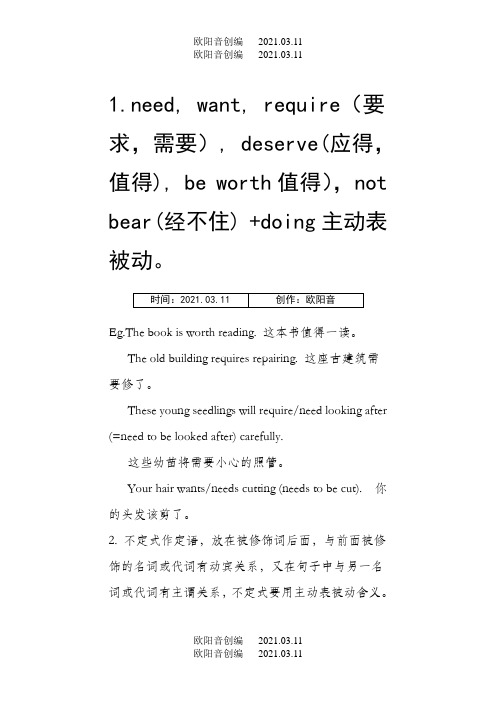
1.need, want, require(要求,需要), deserve(应得,值得), be worth值得),not bear(经不住) +doing主动表被动。
时间:2021.03.11 创作:欧阳音Eg.The book is worth reading. 这本书值得一读。
The old building requires repairing. 这座古建筑需要修了。
These young seedlings will require/need looking after (=need to be looked after) carefully.这些幼苗将需要小心的照管。
Your hair wants/needs cutting (needs to be cut).你的头发该剪了。
2. 不定式作定语,放在被修饰词后面,与前面被修饰的名词或代词有动宾关系,又在句子中与另一名词或代词有主谓关系,不定式要用主动表被动含义。
I have much work to do. 我有许多要做的事情。
(与work有动宾关系,与I有主谓关系)Tom is looking for a room to live in. Tom在找一间住的房间。
(与room有动宾关系,与Tom 有主谓关系)He has a family to support.他要维持一个家庭。
(与family有动宾关系,与he有主谓关系)3. 不定式修饰作表语和宾语补足语的形容词时,结构:主语+系动词+形容词+ 不定式;动词+宾语+形容词+不定式。
如果形容词是表示难易、利弊等含义,如difficult, easy, comfortable(舒适的), convenient(便利的,方便的), hard, cheap, expensive, 等,不定式用主动表被动。
The question is difficult to answer. 这个问题很难回答。
英语中不能用于被动语态的动词都有哪些之欧阳物创编
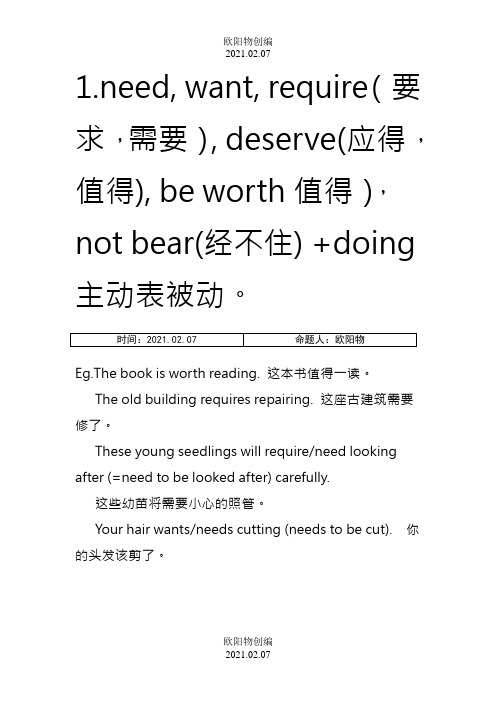
1.need, want, require(要求,需要), deserve(应得,值得), be worth值得),not bear(经不住) +doing 主动表被动。
时间:2021.02.07 命题人:欧阳物Eg.The book is worth reading. 这本书值得一读。
The old building requires repairing. 这座古建筑需要修了。
These young seedlings will require/need looking after (=need to be looked after) carefully.这些幼苗将需要小心的照管。
Your hair wants/needs cutting (needs to be cut).你的头发该剪了。
2. 不定式作定语,放在被修饰词后面,与前面被修饰的名词或代词有动宾关系,又在句子中与另一名词或代词有主谓关系,不定式要用主动表被动含义。
I have much work to do. 我有许多要做的事情。
(与work有动宾关系,与I有主谓关系)Tom is looking for a room to live in. Tom在找一间住的房间。
(与room有动宾关系,与Tom 有主谓关系)He has a family to support.他要维持一个家庭。
(与family有动宾关系,与he有主谓关系)3. 不定式修饰作表语和宾语补足语的形容词时,结构:主语+系动词+形容词+ 不定式;动词+宾语+形容词+不定式。
如果形容词是表示难易、利弊等含义,如difficult, easy, comfortable(舒适的), convenient(便利的,方便的), hard, cheap, expensive, 等,不定式用主动表被动。
The question is difficult to answer. 这个问题很难回答。
英语语法不能用于被动语态的动词和词组
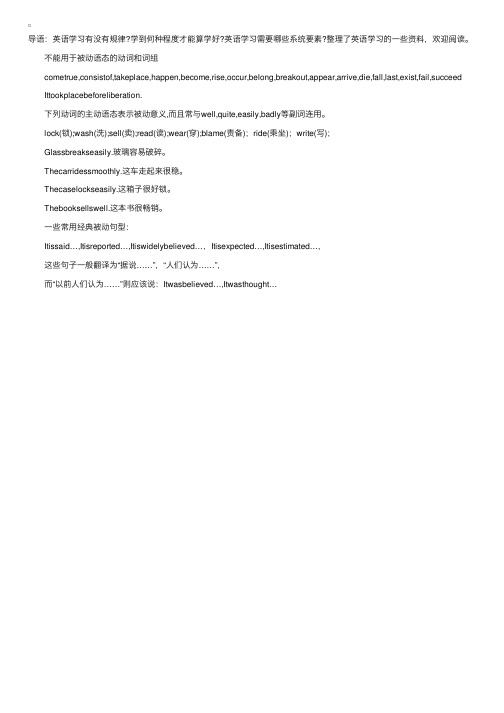
导语:英语学习有没有规律?学到何种程度才能算学好?英语学习需要哪些系统要素?整理了英语学习的⼀些资料,欢迎阅读。
不能⽤于被动语态的动词和词组
cometrue,consistof,takeplace,happen,become,rise,occur,belong,breakout,appear,arrive,die,fall,last,exist,fail,succeed
Ittookplacebeforeliberation.
下列动词的主动语态表⽰被动意义,⽽且常与well,quite,easily,badly等副词连⽤。
lock(锁);wash(洗);sell(卖);read(读);wear(穿);blame(责备);ride(乘坐);write(写);
Glassbreakseasily.玻璃容易破碎。
Thecarridessmoothly.这车⾛起来很稳。
Thecaselockseasily.这箱⼦很好锁。
Thebooksellswell.这本书很畅销。
⼀些常⽤经典被动句型:
Itissaid…,Itisreported…,Itiswidelybelieved…,Itisexpected…,Itisestimated…,
这些句⼦⼀般翻译为“据说……”,“⼈们认为……”,
⽽“以前⼈们认为……”则应该说:Itwasbelieved…,Itwasthought…。
不能用于进行时态和被动语态的动词

1. belong to属于……Our success belongs to all the people present. 我们的成功属于在座的每一个人。
2. stand, lie等静态动词这些动词表某物位于某处。
There stands a high building over there. 那边矗立着一座高高的楼房。
3. taste, feel, look, smell, sound 等感官动词This kind of food tastes good. 这种食物尝起来味道很好。
Ice always feels cold to us. 对我们来说冰摸起来总是冷的。
4. stay, keep, remain等动词The weather has stayed hot recently.最近天气一直很热。
After his election to a high office, he remained modest. 在被选为高级领导干部之后他仍然谦虚。
5. sell well( 畅销), last well(持久), wash well(耐洗), write well(写起来流畅)等动副搭配This kind of flower sells well. 这种花很畅销。
The pens produced in this factory write well .这家工厂生产的钢笔写起来流畅。
6. wash easily(易洗), break easily(易折), write smoothly(写起来流畅), light easily(易燃)等动副搭配This kind of cloth washes easily. 这种布容易洗。
It is very wet, the match does not light easily.天气很潮湿,火柴不易划着。
7. meet 遇见;碰到I met him in the street at eight yesterday morning. 昨天早晨8点钟我在街上碰到他。
- 1、下载文档前请自行甄别文档内容的完整性,平台不提供额外的编辑、内容补充、找答案等附加服务。
- 2、"仅部分预览"的文档,不可在线预览部分如存在完整性等问题,可反馈申请退款(可完整预览的文档不适用该条件!)。
- 3、如文档侵犯您的权益,请联系客服反馈,我们会尽快为您处理(人工客服工作时间:9:00-18:30)。
不能用于被动语态的总结
1、there be 结构及所有的不及物动词或动词短语充当谓语时,无被动语态。
There are twelve months in a year.
The war broke out in 1937.(break out, 爆发)
The story took place in a small mountain village. (take place,发生)
常见的不及物动词或动词短语有:appear, die, happen, lie(躺;位于), remain, occur, come true, break out, take place 等。
2、表示“状态”的谓语动词,如:last, hold, keep, suit, remain, look like, consist of 等不能用被动语态。
The hall can hold more than 500 people. (hold,容纳)
The project lasted 14 years and cost 1 billion US dollars. (last,延续)
No dish suits all tastes. (suit,适合)
The committee consists of ten members.委员会由十人组成。
3、表示“归属”的动词,如have,own,belong to 等。
We have three meals a day.我们一日吃三餐。
We have six classes every day. (have,上课)
Our success belongs to all the people. 我们的成功属于每一个人。
(belong to, 属于) 4、表示“希望、意图”的动词,如wish,want,hope,like,love,hate等。
But I hate autumn and winter。
但是我讨厌秋天和冬天。
5、宾语是反身代词或相互代词时谓语动词用主语语态,不能用被动语态。
We should help each other.(宾语为相互代词)
I found myself unable to speak.我发现自己说不出话了。
(宾语为反身代词)
6、宾语是同源宾语、不定式、动名词等谓语动词不用被动语态。
In the past, they lived a miserable life. (同源宾语)
They don’t allow smoking. (动名词)
7、主动形式表示被动意义。
①当某些连系动词,如feel、look、smell、taste、sound等后面接形容词时。
The fish smells good .鱼闻起来很香。
The steel feels very cold. 钢铁摸起来很凉。
This kind of food tastes good. 这种食物尝起来味道很好。
②当burn(燃烧)、clean(打扫)、cook(煮)、cut(切)、read(读)、sell(销售)、wash(洗)、wear(穿)、write(写)等表示主语内在“品质或性能”的动词,其后跟一个副词如well(好)、easily(容易地)、perfectly(十分地)等连用,描绘事物的特性,用主动表被动,结构是主语+动词+副词。
sell well( 畅销), last well(持久), wash well(耐洗), write well(写起来流畅);
wash easily(易洗), break easily(易折), write smoothly(写起来流畅), light easily(易燃)。
The book sells well.这种书很畅销。
The pen writes smoothly. 这钢笔写起来流畅。
This kind of cloth washes easily. 这种布料容易洗。
The match does not light easily. 火柴不易点燃。
③当动词表示“开始、结束、关、停、转、启动”等意义,说明主语的意志时。
The door won’t lock. 门锁不上。
The car won’t start. 车就是发动不起来。
④deserve, need, require, want后面的动名词表示被动含义。
The room needs cleaning (needs to be cleaned).这房间需要打扫。
The old building requires repairing (requires to be repaired). 这座古建筑需要修了。
Your hair wants/needs cutting (wants to be cut).你的头发该剪了。
注:这些动词后的动名词可以替换成动词不定式的被动形式。
⑤be worth doing 用主动形式表示被动意义。
This book is well worth reading.
8、meet 遇见;碰到
I met him in the street at eight yesterday morning.
昨天早晨8点钟我在街上碰到他。
注:meet表迎接时有被动语态。
如: I was met at the airport by all my old friends in that city. 该城老友全都到机场迎接我。
9、weigh 物体所称重量为……
This stone weighs 200 tons. 这块石头重200吨。
当weigh表示“称……”时有被动语态。
如: This stone will be weighed this evening. 今晚这块石头将被称出重量。
10、open店铺开门营业
This shop doesn't open on Sunday. 这家商店周日不开门营业。
当open表“打开; 开幕; 开张”时有被动语态。
如: This door was opened by Li Ping. 门是被李平打开的。
This sports meeting will be opened next week.运动会将于下周开幕。
11、come into being 形成; 产生(不可用于被动语态或进行时)
When did the Roman Empire come into being? 罗马帝国是什么时候形成的?
Their army came into being in 1938. 他们军成立于1938年。
12、happen为不及物动词,不能用于被动语态。
例如,表示"这故事发生在去年。
”不能说:The story was happened last year.可以说:The story happened last year. happen为短暂性动词,不能与表示一段时间的状语连用。
例如,表示"这事发生一年了。
"不能说:This happened for one year.可以说:This happened one year ago.
happen一般用来强调某事发生的偶然性。
要表示事先安排或有准备的事情或活动,则不能用happen,而要用take place。
例如:
A sports meeting took place(=was held) in our school last week.上周我校举行了运动会。
(不能说:A sports meeting happened in our school last week.)
13、不定式作定语,放在被修饰词后面,与前面被修饰的名词或代词有动宾关系,又在句子中与另一名词或代词有主谓关系,不定式要用主动表被动含义。
I have much work to do. 我有许多要做的事情。
(与work有动宾关系,与I有主谓关系)
Tom is looking for a room to live in. Tom在找一间住的房间。
(与room有动宾关系,与Tom 有主谓关系)
He has a family to support.他要维持一个家庭。
(与family有动宾关系,与he有主谓关系)。
